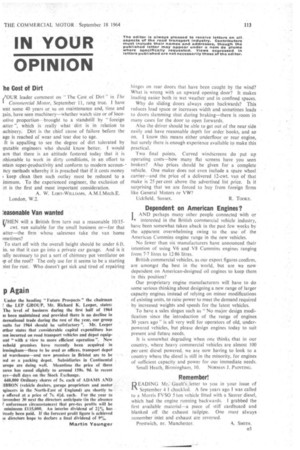IN YOUR OPINION
Page 116

If you've noticed an error in this article please click here to report it so we can fix it.
he Cost of Dirt (OUR leader comment on "The Cost of Dirt in The L Commercial Motor, September 11, rang true. 1 have ient some 40 years or so on maintenance and, time and ;rain, have seen machinery—whether watch size or of locootive proportion.---brought to a standstill by "foreign latter ", which is really what • dirt is in relation to lachinery. Dirt is the chief cause of failure before the age is reached of wear and tear due to age.
It is appalling to see the degree of dirt tolerated by :putable engineers who should know better. I would am n that there is an attitude fostered today that it is shionable to work in dirty conditions, in an effort to istain super-productivity and conform to modern accoun-• .ncy methods whereby it is preached that if it costs money
keep clean then such outlay must be reduced to a inimurn. To the experienced engineer, the exclusion of .rt is the first and most important consideration.
A. W. LORT-WILLIAMS, A.M.I.Mech.E. London, W.2.
:easonable Van wanted VHEN will a British firm turn out a reasonable 10/15cwt. van suitable for the small business or—for that Latter—the firm whose salesmen take the van home nnetimes?
To start off with the overall height should be under 6 ft. in. so that it can go into a private car garage. And is it ;ally necessary to put a sort of chimney pot ventilator on ip of the roof? The only use for it seems to be a starting Ant for rust. Who doesn't get sick and tired of repairing hinges on rear doors that have been caught by the wind? What is wrong with an upward opening 'door? It makes loading easier both in wet weather and in confined spaces.
Why do sliding doors always open backwards? This reduces load space or increases width and sometimes leads to doors slamming shut during braking—there is room in many cases for the door to open forwards.
Also the driver should be able to get out of the near side easily and have reasonable depth for order books, and so on. I know this means either underfloor or rear engine, but surely there is enough experience available to make this practical.
Two final points. Curved windsereens do put up operating costs—how many flat screens have you seen broken? Also prices should be given for a complete vehicle. One maker does not even include a spare wheel carrier—and the price of a delivered 12-cwt. van of that make is 25 per cent above the advertised list price. Is it surprising that we are forced to buy from foreign firms like General Motors or VW?
Uckfield, Sussex. R. TooKE.
Dependent on American Engines?
1 AND perhaps many other people connected with or 1, interested in the British commercial vehicle industry, have been somewhat taken aback in the past few weeks by the, apparent overwhelming swing to the use of the American Cummins engine range in the new vehicles.
No fewer than six manufacturers have announced their intention of using V6 and V8 Cummins engines ranging from 7.7 litres to 12.86 titres.
British commercial vehicles, as our export figures confirm, are amongst the best in the world, but are we now dependent on American-designed oil engines to keep them in this position?
Our proprietary engine manufacturers will have to do some serious thinking about designing a new range of larger capacity engines instead of relying on minor modifications of existing units, to raise power to meet the demand required by increased weights and speeds for the latest vehicles.
To have a sales slogan such as "No major design modification since the introduction of the range of engines 30 years ago " is all very well for operators of old, underpowered vehicles, but please design engines today to suit present and future needs.
It is somewhat degrading when one thinks That in our country, where heavy commercial vehicles are almost 100 per cent diesel powered, we are now having to look to a country where the diesel is still in the minority, for engines of sufficient capacity and power for our immediate needs.
Small Heath, Birmingham, 10, NORMAN 1. PAINTING.
Remember!
READING Mr. Gault's letter to you in your issue of September 4 I chuckled. A few years ago I was called to a Morris FVSO 5 ton vehicle fitted with a Saurer diesel, which had the engine running backwards. I grabbed the first available material a piece of stiff cardboard and blanked off the exhaust tailpipe. One must always remember inlet and exhaust are reversed.
A. SMITH.
Prestwich, nr. Manchester.


































































































































































































































































